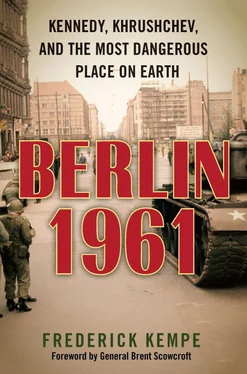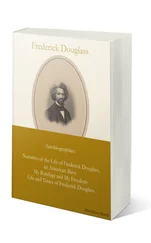Though Kennedy’s campaign rhetoric was hawkish against Moscow, the KGB chalked that up less to conviction than to political expedience and the influence of his anticommunist father, Joe. Khrushchev welcomed Kennedy’s calls for nuclear test ban negotiations and his statement that he would have apologized for the U-2 incursions if he had been president when they occurred. More to the point, Khrushchev believed he could outmaneuver Kennedy, a man whom his foreign ministry had characterized as “unlikely to possess the qualities of an outstanding person.” The consensus in the Kremlin was that the young man was a lightweight, a product of American privilege who lacked the experience required for leadership.
The candidates continued to shower attention on Khrushchev as he monitored their campaign from his suite at the Soviet Mission at Sixty-eighth Street and Park Avenue, where he would occasionally appear on the balcony of a turn-of-the-century mansion built originally for the banker Percy Pyne. In the initial Kennedy–Nixon debate in a Chicago TV studio on September 26—the first live-broadcast presidential debate ever—Kennedy’s opening statement before sixty million American viewers spoke directly to Khrushchev’s New York stay and “our struggle with Mr. Khrushchev for survival.”
Though the debate was to have been about domestic issues, Kennedy worried that the Soviet Union was churning out “twice as many scientists and engineers as we are” while the U.S. continued to underpay its teachers and underfund its schools. He declared that he would do better than Nixon in keeping America ahead of the Soviets in education, health care, home construction, and economic strength.
During their second debate on foreign policy on October 7 in Washington, D.C., the candidates focused squarely on Khrushchev and Berlin. Kennedy predicted that the next president “in his first year is going to be confronted with a very serious question on our defense of Berlin, our commitment to Berlin. It’s going to be a test of our nerve and will.” He said that President Eisenhower had allowed American strength to erode and that he, if elected, would ask Congress to support a military buildup, because by spring or winter “we’re going to be face-to-face with the most serious Berlin crisis since 1949 or 1950.”
During the campaign, Adlai Stevenson had counseled Kennedy to avoid discussing Berlin altogether because it would be “difficult to say anything very constructive about the divided city without compromising future negotiations.” So Kennedy had raised Berlin in only half a dozen speeches. Yet before a national television audience the subject was impossible to avoid, particularly after Khrushchev had told United Nations correspondents he wanted the U.S. to join a summit on Berlin’s future shortly after elections—to be followed by a UN General Assembly meeting on the matter in April.
During their third debate on October 13, Frank McGee of NBC News asked both candidates whether they would be willing to take military action to defend Berlin. Kennedy responded with his clearest statement of the campaign on Berlin: “Mr. McGee, we have a contractual right to be in Berlin coming out of the conversations at Potsdam and of World War II that has been reinforced by direct commitments of the President of the United States. It’s been reinforced by a number of other nations under NATO…. It is a commitment that we have to meet if we are going to protect the security of Western Europe, and therefore on this question I don’t think there is any doubt in the mind of any American. I hope there is not any doubt in the mind of any member of the community of West Berlin. I’m sure there isn’t any doubt in the mind of the Russians. We will meet our commitments to maintain the freedom and independence of West Berlin.”
For all Kennedy’s apparent conviction, Khrushchev sensed the makings of compromise. Kennedy talked of U.S. contractual rights in Berlin but not of moral responsibility. He wasn’t sounding the usual Republican clarion call to free captive nations. He wasn’t even suggesting that freedom should spread across the city’s border to East Berlin. He had spoken of West Berlin and of West Berlin alone. Kennedy was talking about Berlin as a technical and legal matter, points that could be negotiated.
Before Khrushchev could test Kennedy, however, he had to put his communist house in order and neutralize rising challenges on two fronts—China and East Germany.
MOSCOW
FRIDAY, NOVEMBER 11, 1960
It was understandable that at first the West overlooked the importance of the world’s largest-ever meeting of communist leaders, given that it was characterized primarily by two weeks of mind-numbing and redundant speeches from eighty-one party delegations from around the world. Behind the scenes, however, Khrushchev was working to neutralize the challenge China’s Mao Tse-tung was mounting to his leadership of world communism—and to gain support within the party for a new diplomatic effort with President-elect Kennedy.
Soviet foreign policy strategists saw their two priorities as the Sino–Soviet alliance and peaceful coexistence with the West, very much in that order. Foreign Minister Andrei Gromyko had argued it would be a mistake to lose Beijing without gaining anything reliable from the U.S., yet that was precisely what had happened during 1960. The Soviet embassy in Beijing reported to Khrushchev that the Chinese were using the aftermath of the U-2 incident and the Paris Summit failure to oppose Khrushchev’s foreign policy “for the first time directly and openly.”
Mao opposed Khrushchev’s foreign policy of peaceful coexistence with the West and sought a course of more intense confrontation both over Berlin and across the developing world. The Chinese delegation had come to Moscow determined to gain increased Kremlin support for national liberation movements and assorted leftists—from Asia and Africa to Latin America.
Now that relations had broken down with the U.S., a number of Soviet officials privately argued that Khrushchev should make a bolder strategic bet on the Chinese. What only a few of them knew, however, was that the personal animosity that had grown between Khrushchev and Mao would make that impossible.
By Khrushchev’s own account, he had disliked Mao since his first visit in 1954 for the fifth anniversary of the People’s Republic. Khrushchev had complained about everything from the endless rounds of green tea (“I can’t take that much liquid”) to what he regarded as his host’s ingratiating, insincere courtesy. Mao was so uncooperative during their talks that Khrushchev had concluded upon returning to Moscow, “Conflict with China is inevitable.”
When a year later West German Chancellor Konrad Adenauer raised concerns with Khrushchev about an emerging Sino-Soviet alliance, Khrushchev dismissed that prospect and pointed to his own concerns about China. “Think of it,” he had said. “Already six hundred million of them and every year twelve million more…. We have to do something for our people’s standard of living, we have to arm like the Americans, [and] we have to give all the time to the Chinese who suck our blood like leeches.”
Mao had shocked Khrushchev with his readiness for war with the U.S., irrespective of the devastation it might bring. Because the Chinese and Soviets together had a vastly greater population, Mao had argued to Khrushchev that they would emerge victorious. “No matter what kind of war breaks out—conventional or thermonuclear—we’ll win,” he had told Khrushchev. “We may lose more than three hundred million people. So what? War is war.” Using what the Soviet leader considered the crudest possible term for sexual intercourse, Mao told Khrushchev the Chinese would simply produce more babies than ever before to replace the dead. Khrushchev came to consider Mao “a lunatic on a throne.”
Читать дальше











